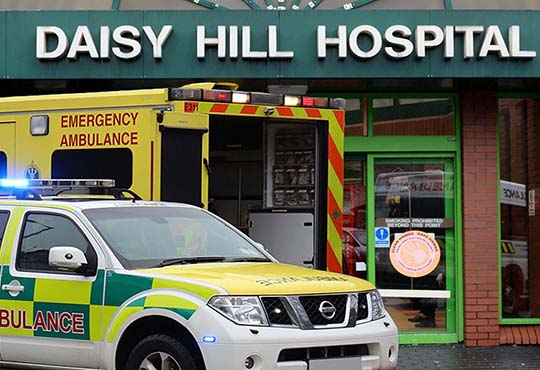NIAS struggles in Southern Area to maintain services against a number of challenging factors including Covid-19.
Down News spoke to the NIAS recently regarding an issue regarding ambulance staff contracting Covid-19 at a social event.
A spokesperson for the NIAS said: “The Northern Ireland Ambulance Service can confirm that 10 members of staff from the NIAS Southern Division who attended a [golf] social event outside of work have advised that they tested positive for COVID-19.
“As a result of this a further six members of staff have been following advice to self-isolate and are unable to come to work.
“The situation is being managed in line with Public Health Guidance and NIAS procedures.
“NIAS can also confirm that 53 staff are stationed in Craigavon for the Southern Area.

“Regarding the levels of cover and ambulance response times, NIAS would refer you to a press release issued in July 2020 which addresses these issues in general terms.
“The situation outlined at that time continues to impact on our operational cover across Northern Ireland including in the Southern Division and is likely to do so as we move into the winter period.”
Covid-19 has had a significant impact on staffing levels within the Southern area on ambulance paramedic levels.
The Challenges Around Ambulance Cover (official statement at July 2020).
As with staff throughout the Health and Social Care system, those working in the Northern Ireland Ambulance Service have demonstrated huge commitment and professionalism in recent months in providing a service and dealing with the pressures associated with the Covid-19 pandemic.
As business returns to normal and demand on the service continues to increase, NIAS is facing increased challenges in maintaining planned levels of cover across all of the Divisions across Northern Ireland.
Regrettably, this will mean that on occasions the response times to some calls will be delayed. NIAS says it will continue to target resources at the most seriously ill or injured to ensure they receive the fastest and most appropriate response to suit their clinical need.
However, NIAS envisages that response times to those patients whose clinical need is less urgent will be longer than might be expected by patients and their carers. At all times, NIAS will seek to respond to all calls in the shortest possible time.
The reasons for this anticipated drop in cover/delayed response times are a result of a number of factors which individually would not be without impact but, when combined, have a much greater impact on our ability to provide cover.
They include:
- Activity levels which have been increasing steadily over recent years without a commensurate increase in staffing levels. A recent, independent, demand/capacity review has indicated that NIAS requires an uplift of more than 300 operational staff to cope with current and projected demand on the service. NIAS is currently developing a business case for consideration by the Department of Health to secure the necessary funding.
- Almost 20% of frontline staff absence from duty due to ordinary sickness or reasons related to Covid-19 which require at risk staff to take precautionary measures in relation to their own health.
- A seasonal reduction in staff availability due to annual leave commitments. NIAS staff have an entitlement of two weeks leave over the summer period, which is rostered. This leave is planned and accommodated by other staff making themselves available for overtime. The NIAS say they are are very grateful to their staff who were willing to postpone their leave normally taken in the Spring to ensure an effective ambulance response during the Covid-19 peak, and for making themselves available to work additional hours. However, those staff are now tired and need to be able to take their leave to recharge their batteries in order to deal with the normal high level of activity but also to be ready, both physically and mentally, to deal with a potential second wave of the virus and the normal winter pressures.
- The challenges facing NIAS are also experienced across the other five Health and Social Care Trusts and this can impact upon the ability of NIAS crews to handover patients at Emergency Departments.
These delays in ambulance turnaround times, due in no small measure to reduced space in the EDs as a result of social distancing requirements, impact greatly on the number of crews the NIAS has available to respond to emergencies in the community, in a timely manner.
NIAS continues to work with colleagues in the Department of Health, Health and Social Care Board and the five hospital Trusts to find solutions to these issues.
These challenges are also compounded by a totally unacceptable increase of assaults on their staff who will, temporarily, be taken off frontline duties to recover.
NIAS anticipates that reduced levels of cover will be experienced across all areas at different times. However, all available resources at any particular time are managed regionally by staff in Emergency Ambulance Control to allocate the nearest available ambulance to the most urgent calls.
Additionally, highly skilled Paramedics within the Control Centre are available to give advice to patients with less urgent clinical needs, advising them of options other than ambulance or ED attendance.
These Paramedics are an invaluable resource within the ambulance service delivery as they often ensure that ambulance crews are not tied up unnecessarily with inappropriate calls.
NIAS crews are also trained to consider if patients, to whom they have attended, would be better suited by options other than ED attendance.
This “see and treat” protocol assists greatly in ensuring the earliest availability of crews to respond to other emergencies.
The NIAS is also very grateful for the support from colleagues in the Voluntary and Private Ambulance Services who assist by providing crews on a nightly basis.
These crews are not despatched to Category 1 or 2 calls. They assist us in those calls which are of a less urgent nature including hospital transfers and Healthcare Professional (e.g. GP) calls.
Their invaluable contribution enables the NIAS to protect its own resources to respond to those calls which are identified as life-threatening or serious in nature.
NIAS Chief Executive, Michael Bloomfield, appealed for support from public representatives and the community in general to ensure that ambulances remain available to respond to life-threatening emergencies. He said: “I appreciate the genuine concern of community and political representatives when informed of shortages in a particular area.
“However, I would like to reassure all stakeholders that we will continue to manage our available resources in a way which best serves the interests of patients and staff.
“The public also have a role to play and we would appeal to them to do so. We still receive too many calls for which options other than calling 999 are available.
“We would ask that people only consider calling 999 for real emergencies, while at the same time advising people not to delay in the case of a real emergency.
“We are there to help you. We want to provide you with the quickest and most appropriate response to your clinical need. We would ask you to remember that not all 999 calls require an immediate response and that if you experience delays to please remain patient.
“Our crews will be with you as soon as possible and will treat you with the utmost care, compassions and respect.
“NIAS staff have, quite rightly, been lauded by the public for their professionalism and commitment during the Covid Pandemic.
“As Chief Executive, I am aware that this commitment and professionalism is ever present and I would like to take this opportunity on behalf of the Senior Team and Trust Board, to offer my sincere thanks to them all.
“From engaging directly with them I am aware of the great personal sacrifices they have made to make themselves available to respond to the crisis and protect the community.
“They do this selflessly and it is greatly appreciated. I am keen that we now enable those same staff to take a well-deserved rest during the coming weeks to give them a chance to be with their families, to whom I would also like to express my thanks for their patience and understanding.”






















